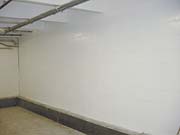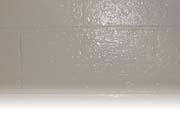
An estimated 30-40% of all food-processing plants are plagued by the proliferation of mold, fungi and bacteria. One of the primary breeding grounds for these dangerous microorganisms exists on the facilities' walls and food storage areas. In facilities dealing with high-risk food products, such as fish, poultry and meat, the most common offenders include listeria, E. coli and salmonella, which can yield severe stomach infections and debilitating symptoms. In bakeries, which deal with high concentrations of yeast, a single-celled fungus, the risk of mold and fungi forming on crevices and cracks in walls is often difficult to address. Certain types of mold are not only capable of contaminating food products, but may also cause respiratory difficulties among the facility's workers.
In addition to possessing many physical threats, these contaminants may also injure the plant's financial health. Many facilities with contamination problems must be temporarily shut down and safeguarded, causing the company to lose up to $2 million per day in lost work, in addition to possible legal fees and decontamination costs.
The current method for safeguarding food-processing facilities involves the application of plastic paneling, fiberglass or steel onto porous surfaces to provide a smooth, waterproof surface. At the end of each day, workers must thoroughly wipe down these areas with a disinfectant to eliminate any residual contaminants.
While this labor-intensive process is marginally effective at eliminating surface contaminants, mold, fungus and bacteria often settle into areas behind the installations. In fact, the removal of this paneling in many facilities reveals a visible concentration of potentially dangerous mold and fungi.

SMP-200 is a high-performance, highly fluorinated coating formulated with a tailored barium metaborate matrix. Currently the only marketed product to possess these capabilities, SMP-200 effectively prevents mold, mildew, fungus and bacteria for up to 30 years.
This is accomplished through a unique fluorinated polymer and EPA-registered anti-microbial package, which forms an impenetrable barrier that is highly resistant to moisture, weathering, abrasion, corrosion and microbiological life. SMP-200 also encapsulates odors and possesses non-stick and stain-blocking capabilities.
The coating is capable of binding to virtually any surface. Suitable substrates include concrete block, ferrous metal, galvanized metal, aluminum, fiberglass, carbon fiber, wood and glass. SMP-200 is also easy to apply and can be spray-applied, brushed, or rolled on in one coat. While the coating is deadly for microorganisms, its environmentally friendly composition gives it a desirable "green product" designation.
By implementing a decontamination strategy that bypasses the need for additional fixtures and superfluous labor, food-processing facilities can ensure up to 30 years of operations unhindered by dangerous contaminants, while saving potentially millions of dollars in labor and decontamination expenses.
With the implementation of a little-known and affordable coating product, one of the nation's most expansive industries finally has the upper hand on one of its oldest nemeses.
For more information contact Ross Sklar at 818/998.3538, fax 818/998.5456 or e-mail ross@seichemical.com.

Report Abusive Comment